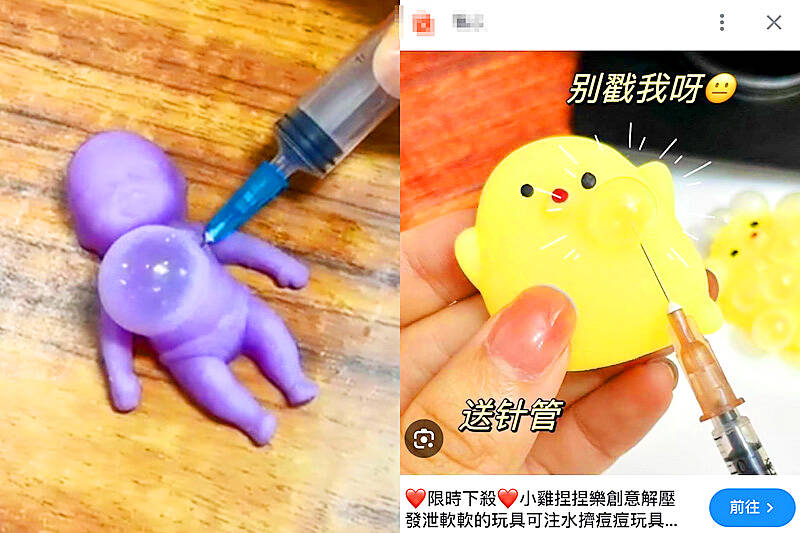The Ministry of Economic Affairs has ordered the removal of a type of Chinese toy called “acne chicken squeeze” (痘痘雞捏捏樂) from e-commerce platforms, as it contains a sharp needle that might be unsafe.
The product, touted as a “stress reliever” for children, consists of a thermoplastic rubber chicken toy with a syringe. People can use the syringe to inject air into the chicken toy, which produces acne-like air bubbles on its surface, then they can squeeze the bubbles to pop them.
However, as the toy contains a syringe with a sharp needle, it does not meet the safety standards for toys, which forbid sharp edges, ministry Bureau of Standards, Metrology and Inspection deputy head Hsieh Han-chang (謝翰璋) said, adding that the bureau has asked e-commerce platforms to remove the toys from their Web sites.

Photo: Screen grab from Sina Weibo and Taiwan Statebuilding Party member Wu Hsin-tai’s Facebook page
The bureau would continue to inspect the online platforms and physical retail locations, he said, adding that if stores fail to remove them from shelves, they could face a penalty.
The Action Alliance on Basic Education on Friday welcomed the government’s swift response to the emergence of the toy, but urged the authorities to improve examinations and management of e-commerce platforms.
Toys should be safe and serve educational and recreational purposes, but this type of dangerous toy highlights a big loophole in the toy market, and parents are very concerned, said Chung Chun-wei (鍾君偉), a representative of the alliance’s parents’ division.
Merely removing the toys from shelves is not enough, because if products that have not passed inspections can easily be sold in the market, dangerous toys would continue to appear and threaten children’s safety, added Lee Yu-han (李雨函), a representative of the alliance’s youth division.
The government must establish a stricter mechanism to examine products before they enter the domestic market, Lee said.
The government should also help parents identify products that are dangerous for children, through education and promotion, so they can avoid purchasing items from unknown sources, alliance chairman Wang Han-yang (王瀚陽) said.
Separately, in a post on his “Dr. Wubow” Facebook page, Wu Han-meng (巫漢盟), an attending physician at the Dianthus Pediatric Clinic, listed four other types of dangerous toys or items he suggested that children should not play with.
Some “slime toys” contain glues, borax, artificial fragrances and glitter, which could harm the nervous or digestive system, or cause contact dermatitis, he said.
A Chinese toy called “carrot knife” (蘿蔔刀) is a fidget tool that has a blade that people can flick out with one hand, but the blade can cut paper and might accidentally stab a classmate’s eyes or skin, causing injuries, he said.
A Chinese product called “nasal inhaler energy bar” (鼻吸能量棒) has two plastic tubes which people can insert into their nostrils and inhale the smells of camphor or peppermint, which are said to have refreshing effects, he said.
However, long-term inhalation of camphor can cause harm to the nervous system and liver, causing difficulty in breathing, nausea and vomiting, he said.
The Chinese “wax bottle candy” is made of wax in the shape of a bottle and filled with flavored syrups or jam. However, as they are sold at low prices, many people do not believe the outer layer is beeswax, but industrial wax that is not edible, Wang said.

An essay competition jointly organized by a local writing society and a publisher affiliated with the Chinese Communist Party (CCP) might have contravened the Act Governing Relations Between the People of the Taiwan Area and the Mainland Area (臺灣地區與大陸地區人民關係條例), the Mainland Affairs Council (MAC) said on Thursday. “In this case, the partner organization is clearly an agency under the CCP’s Fujian Provincial Committee,” MAC Deputy Minister and spokesperson Liang Wen-chieh (梁文傑) said at a news briefing in Taipei. “It also involves bringing Taiwanese students to China with all-expenses-paid arrangements to attend award ceremonies and camps,” Liang said. Those two “characteristics” are typically sufficient

A magnitude 5.9 earthquake that struck about 33km off the coast of Hualien City was the "main shock" in a series of quakes in the area, with aftershocks expected over the next three days, the Central Weather Administration (CWA) said yesterday. Prior to the magnitude 5.9 quake shaking most of Taiwan at 6:53pm yesterday, six other earthquakes stronger than a magnitude of 4, starting with a magnitude 5.5 quake at 6:09pm, occurred in the area. CWA Seismological Center Director Wu Chien-fu (吳健富) confirmed that the quakes were all part of the same series and that the magnitude 5.5 temblor was

The brilliant blue waters, thick foliage and bucolic atmosphere on this seemingly idyllic archipelago deep in the Pacific Ocean belie the key role it now plays in a titanic geopolitical struggle. Palau is again on the front line as China, and the US and its allies prepare their forces in an intensifying contest for control over the Asia-Pacific region. The democratic nation of just 17,000 people hosts US-controlled airstrips and soon-to-be-completed radar installations that the US military describes as “critical” to monitoring vast swathes of water and airspace. It is also a key piece of the second island chain, a string of

The Central Weather Administration has issued a heat alert for southeastern Taiwan, warning of temperatures as high as 36°C today, while alerting some coastal areas of strong winds later in the day. Kaohsiung’s Neimen District (內門) and Pingtung County’s Neipu Township (內埔) are under an orange heat alert, which warns of temperatures as high as 36°C for three consecutive days, the CWA said, citing southwest winds. The heat would also extend to Tainan’s Nansi (楠西) and Yujing (玉井) districts, as well as Pingtung’s Gaoshu (高樹), Yanpu (鹽埔) and Majia (瑪家) townships, it said, forecasting highs of up to 36°C in those areas